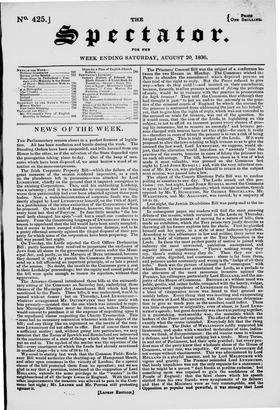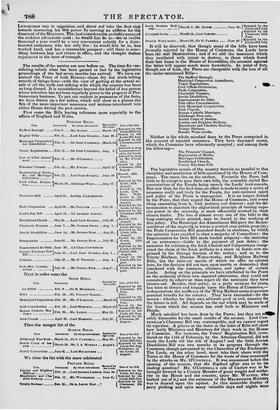NEWS OF THE WEEK.
THE Parliamentary session closes in a perfect ferment of legisla- tion. All has been confusion and bustle during the week. The
Standing Orders have been suspended, and bills hurried from one House to the other, as if the salvation of the State depended upon the prorogation taking place to-day. Out of the heap of mea- sures which have been disposed of, we must bestow a word of at- tention on the more conspicuous.
The Irish Corporate Property Bill—which the failure of the great measure of the session rendered imperative, as a curb on the plunderers left in possession—was attacked by Lord
LYNDHURST, chiefly on the ground that it imputed corruption to the existing Corporations. This, said his unblushing Lordship,
was a calumny ; and it was a mistake to suppose that any thing worse than partisanship had ever been admitted against those pure bodies. Now, a maleadministration of corporate funds was dis-
tinctly alleged by Lord LYNDHURST himself, on the 18th of April,
as a justification of the utter extinction of the Corporations which be proposed. On the 18th of August, however, they are free from every taint but that of Toryism. In four little months "tile leo-
pard bath changed . his spots"—all but a small one conducive to beauty. From the threatening language of LYNDHURST there was
reason to apprehend that the bill would have been sorely mangled; but it seems to have escaped without serious damage, and to be a pretty effectual security against the illegal disposal of their pro- perty for which some of the corporators have been preparing. The bill was passed last night.
On Tuesday, the Lords rejected the Civil Offices Declaration Bill ; partly because they resolved to perpetuate the exclusion of Jews from all share in the government of towns under the Muni- cipal Act, and partly, as the Marquis of BUTE intimated, because they deemed it right to punish the Commons for presuming to send up a bill affirming an important principle, at so late a period of the session. No doubt, the insult to the Commons gave a zest to their Lordships' proceedings; but the equity and sound policy of the bill were quite enough to insure its rejection, without that aggravation.
The Attorney-General introduced three bills at the extraordi- nary sitting of the Commons on Saturday last, embodying those clauses of the Municipal Act Amendment Bill which had been sanctioned by the Peers. These bills, it was understood, would be passed without demur ; but on Thursday, Lord LYNDHURST- whatever arrangement Mr. DRINKWATER may have made with him privately—insisted that the one which was intended to regu- late Municipal Elections must be thrown out, unless Ministers would consent to purchase it at the expense of engrafting upon it the repudiated clause respecting the Charity Trusteeship. This .1.iause had no necessary connexion whatever with the object of the bill ; and any thing like an argument on the merits of the mea- sure LYNDHURST did not affect to offer. But of course there was a sufficient motive; and, without going into particulars, we may mention that the Tories of Ipswich and Sunderland are interested in the continuance of a state of things which the bill would have put an end to. The upshot of the matter was the rejection of the bill—every enactment of which the Lords had already sanctioned in another shape—by a vote of 30 to 14. We erred in stating last week that the Common Fields Enclo- sure Bill would authorize the shutting-up of Hampstead Heath, and other open commons in the vicinity of London; for a special clause of the bill protected them from its operation ; and we are glad to say that a provision, introduced at the suggestion of Lord HOLLAND, extends the same privilege to the "wastes" in the neighbourhood of all the large towns in England. With this and other improvements the measure was allowed to pass in the Com- mons last night; Mr. LEADER and Mr. POTTER still protesting against it.
(LATEST EDITION.]
The Prisoners' Counsel Bill was the subject of a conference be- tween the two Houses on Monday. The Commons wished tha Peers to abandon the amendment which deprived persons on their trial of the right to reply. But the Peers refused to give way—when do they yield ?—and insisted on their amendment, because, forsooth, toallow persons accused of felony the privilege of reply, would be at. variance with the practice in prosecutions for high treason ! They told the Commons, that although they had thought it just " to put an end, to the anomaly in the prac- tice of the criminal courts of England by which the counsel for the prisoner is restrained from addressing the jury on his behalf," yet, that to give him the right of reply, which was not conceded to the accused on trials for treason, was out of the question. So it would seem, that the aim of the Lords, in legislating on this subject, is not to afford an innocent person every chance of prov- ing his innocence, but to remove an anomaly ! and becausa per- sons charged with treason have not this right—for such it really is—therefore in cases of felony the prisoner is to run a risk of being hanged unjustly. This is truly worthy of the Lords. If it were proposed to alter thelaws relating to high treason so as to give the accused the last word, Lord LYNDHURST, we suppose, would ob- ject, that the alteration would introduce an " anomaly " into the practice of the courts, because in cases of felony the prisoner has no such advantage. The bill, however, shorn as it was of what made it most valuable, was pressed on the Commons last night by Lord JOHN RUSSELL; and, with the very reluctant con- sent of Mr. EwAitr, who pledged himself to return to the subject next session, was passed into a law. The object of the County Elections Polls Bill was to confine polling in counties to one day. The Lords struck out this pro- vision ; yet, last night, Lord Jcnire RUSSELL moved the Commons to agree to the Lords' amendments; which strange motion, though opposed by Mr. T. DUNCOMBE, Sir GEORGE STRICKLAND, Mr. WARBURTON, and Mr. AGLIONBY, was carried, by a majority of 50 to 26.
Last night, the Jewish Disabilities Bill was postponed to the in- definite future.
In subsequent pages our readers will find the most amusing debate of the session, which occurred in the Lords on Thursday. LYNDHURST, on the pretext of moving for a return of bills, then made an exhibition, which the Tory prints very justly describe as throwing all his former exploits into the shade. First he glorified himself and his party, in a style of most ludicrous hyperbole. According to this adventurer in law and politics, there never was such a body of virtuous sages as the Tory Opposition in the Lords. In them the most perfect purity of motive is joined with industry the most unwearied, patriotism unsurpassed, and sagacity almost superhuman. • "There's nothing wrong they say, there's nothing wrong they do." Then they are uni- formly calm, dignified, and courteous : abuse is far from them, and patience under contumely and wrong is the" badge of all their tribe.' Such was the picture of himself and " comrogues" with which Baron LYNDHURST entertained the Lords, as a prelude to the utterance of the most rancorous invective against the Premier, his colleagues, particularly Lord HOLLAND, and the ma- jority of the House of Commons. BROUGHAM'S wildest mood was polite, gentle, and rather feeble, compareJ with the hearty, vulgar, straightforward impudence of LYNDHURST on Thursday. Such a blast of vituperation never was heard in that genteel as- sembly before. Every thing that was insulting and exasperating was thrown at Lord iVIELBouaNs, with the saturnine determina- tion to give as much pain as the assailant could inflict. There was little eloquence or originality, even of abuse, in Lord Limn- URST'S speech; but great dexterity was shown in putting together, in a painstaking, workmanlike way, the materials which the leaders of the Times Ind supplied. The effect of the whole was not exactly what the orator intended. Everybody felt that the thing was overdone. The Duke of WELLINGTON coldly supported his lieutenant, and spoke with a marked moderation of tone, indica- tive, we think, of disappointment : the old warrior came to witness a defence, and he had heard nothing but a tirade. Many Tories, in and out of Parliament, had their spite gratified; but every pru- dent man of the party knew that wholesale abuse of the House of Commons, at any rate, was impolitic. Of course LYNDHURST did not escape without chastisement. This was administered by Lord HOLLAND in a playful manner, and by Lord MELBOURNE with vigour and gravity. The Premier reminded Lord LYNDHURST, that hardy impudence was not the only requisite for a statesman ; that he might be a person "dun frontis et perdita3 audacire:' but something more was required to gain the confidence of the People of England ; that the faint cheers which his speech elicited from his own friends were symptomatic of its failure; and that if the Ministers were so very contemptible, and the Opposition so popular and powerful, it was strange that Lord LYNDHURST was in opposition, and durst not take the first step towards recovering his lest power by moving an address for the dismissal of the Ministers. this last consideration probably annoyed the reckless adventurer most : he etould fain be in—tett or twelVe thousand a year would be a very convenient subsidy for a disin- terested statesman who has only five : he would fain be in, has worked hard, and has a reasonable prospect : still there is some- thing between him and return to office, and the theught dashes enjoyment in the hour of triumph.



























